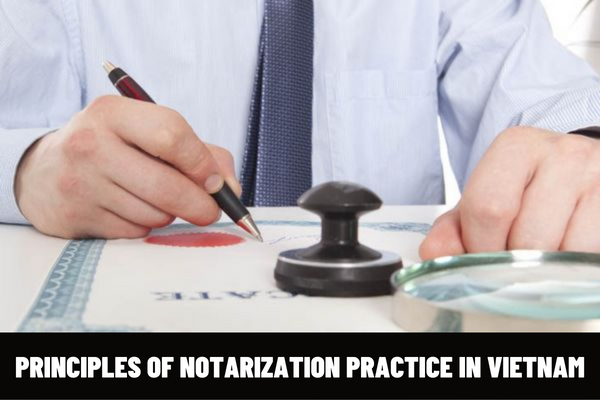What are 04 principles of notarization practice in Vietnam? What are the things which notaries are prohibited to do in relationship with applicants for notarization?
What are 04 principles of notarization practice in Vietnam?
Article 2 of the rule on notarization practice ethics promulgated together with Circular No. 11/2012/TT-BTP stipulates the principles of notarization practice as follows:
Principles of notarization practice
Notaries must abide by the following principles:
1. To abide by Constitution, Law, not contrary to social ethics.
2. To be objective, honest upon performing notarization, do not affect to quality of notarization for any reason as well as discriminate against applicants for notarization.
3. To take responsibilities before law on notarized documents, pay compensation for damages due to their fault in case notarization leads damages for applicants for notarization.
4. To abide by provisions of this Rule on notarization practice ethics and regulations of notarization profession-social organization.
Thus, the 04 principles of notarization practice are:
- To abide by Constitution, Law, not contrary to social ethics.
- To be objective, honest upon performing notarization, do not affect to quality of notarization for any reason as well as discriminate against applicants for notarization.
- To take responsibilities before law on notarized documents, pay compensation for damages due to their fault in case notarization leads damages for applicants for notarization.
- To abide by provisions of this Rule on notarization practice ethics and regulations of notarization profession-social organization. 
What are 04 principles of notarization practice in Vietnam? What are the things which notaries are prohibited to do in relationship with applicants for notarization? (Image from the Internet)
What are the things which notaries are prohibited to do in relationship with applicants for notarization?
The things which notaries are prohibited to do in relationship with applicants for notarization are specified in Article 9 of the rule on notarization practice ethics promulgated together with Circular No. 11/2012/TT-BTP as follows:
Things which notaries are prohibited to do in relationship with applicants for notarization
1. Harassing for bribes, causing difficulties for applicants for notarization.
2. Receiving, claiming any amounts, other benefits from applicants for notarization, apart from notarization charges, remunerations and other cost which have been prescribed, defined, agreed.
3. Receiving money or any material benefit from the third person in order to perform or not perform notarization that arising consequence, causing damage to legitimate benefit of applicants for notarization and relevant parties.
4. Using information which they know from notarization in order to seek personal benefits.
5. Performing notarization in a case where the objectives and content of a contract or transaction breach the law or contrary to social morals.
6. Giving out promises, engagement aiming to attract applicants for notarization or willingly collect at higher or lower rates of notarization charges, remunerations comparing to regulations or agreements.
7. Notarizing contracts, transactions related to benefit between notaries and applicants for notarization.
8. Collaborating with, facilitating for applicants for notarization to breach lawful rights and interests of other organizations, individuals.
9. Paying commission, discount for applicants for notarization or brokers.
10. Colluding with applicants for notarization, relevant persons to falsify content of notarized written documents and dossiers.
Thus, things which notaries are prohibited to do in relationship with applicants for notarization include:
- Harassing for bribes, causing difficulties for applicants for notarization.
- Receiving, claiming any amounts, other benefits from applicants for notarization, apart from notarization charges, remunerations and other cost which have been prescribed, defined, agreed.
- Receiving money or any material benefit from the third person in order to perform or not perform notarization that arising consequence, causing damage to legitimate benefit of applicants for notarization and relevant parties.
- Using information which they know from notarization in order to seek personal benefits.
- Performing notarization in a case where the objectives and content of a contract or transaction breach the law or contrary to social morals.
- Giving out promises, engagement aiming to attract applicants for notarization or willingly collect at higher or lower rates of notarization charges, remunerations comparing to regulations or agreements.
- Notarizing contracts, transactions related to benefit between notaries and applicants for notarization.
- Collaborating with, facilitating for applicants for notarization to breach lawful rights and interests of other organizations, individuals.
- Paying commission, discount for applicants for notarization or brokers.
- Colluding with applicants for notarization, relevant persons to falsify content of notarized written documents and dossiers.
What are the things which a notary is not permitted to do in relation with colleagues?
The things which a notary is not permitted to do in relation with colleagues are specified in Article 12 of the rule on notarization practice ethics promulgated together with Circular No. 11/2012/TT-BTP specifically:
- Offending or having acts causing damage to prestige of colleagues, notary practice organizations.
- Pressuring, threatening or performing acts breaching law, contrary to social ethics with colleagues in order to scramble advantages for themselves in practicing profession.
- Cooperating with individuals, organizations having ability of pressuring, to compel the applicants for notarization to arrive their notary practice organizations for notarization with purpose for profit.
- Conducting any advertisement for themselves and their notary practice organizations under any form which are not in accordance with regulations of law.
- Conducting acts of broker, receiving or requiring commission when introducing colleagues to the applicants for notarization which they do not undertake.
- Opening other branches, representative offices, establishments, transaction places apart from head office of notary practice organizations.
- Other unsound competition acts.
LawNet
